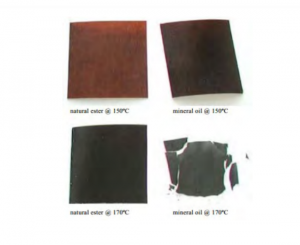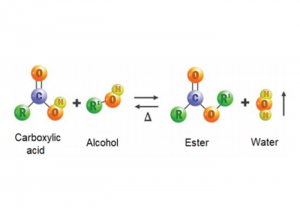Why is transformer oil important?
A failure of transformer insulation can prove fatal to the transformer and consequently disrupt electric power transmission. Although the transformer insulation system (for oil-type transformers) is a combination of oil and solid cellulose paper, the fluid is what determines its quality. Transformer oil also has elements that are indicative of the overall health of the transformer. For example, a DGA transformer oil test shows levels of gases like acetylene and ethylene rising above a safe limit. This indicates the aging of the transformer. Other crucial transformer oil tests are Power/Dissipation factor and Oil BDV that indicates the dielectric strength and power factor of the transformer oil. Any deviation from ideal values is an alarming sign that the transformer needs attention to mitigate the risk of failure.
Types of Transformer Oil
Transformer oil can be categorized into three types: Mineral oil, Silicone-based oil, and Bio-based oil. Owing to the excellent cooling and insulating property of mineral oils, these have been the most used transformer oil for many years. However, as years and research progressed, the shortcoming of mineral oils started to gain attention. Poor biodegradability, potential flammability, and low moisture tolerance are being the most important concerns.
Viable Solution: A better alternative is to use bio-based transformer oil. These are usually ester oils which can further be classified as Natural and Synthetic ester oils. They are easily biodegradable and safe from fire hazards. Research indicates that ester oils extend the life of cellulose insulation as well, bringing more benefits for its use.
Comparison of Ester Oil & Mineral Oil: Even though the popularity of bio-based transformer oil has not surpassed that of mineral oils, these transformer oils are gaining attention for better properties.
| Property | Mineral Oil | Natural Ester | Synthetic Ester |
| Fire Point | 1800 C | 3600 C | 3100 C |
| Flash Point | 1600 C | 3300 C | 2600 C |
| Biodegradability | NO | Ultimately | Readily |
| Toxicity | Toxic | Non-Toxic | Less Toxic |
| Viscosity @ 400 C | 12 | 37 | 29 |
| Thermal Aging | Good | Better | Best |
Table: Properties comparison of Mineral Oil Vs Ester Oil. Source: Manufacturer’s Website
Ester oils can be utilized as a replacement for mineral oil in distribution and power class transformers. We will examine its benefits in details below:
Long Transformer Life: One of the prime reasons for transformer failure is the degradation of its insulation. The sludge formed as a result of mineral oil oxidation is a common reason for the same. Synthetic esters are more resistant to oxidation and can sustain at higher temperatures as well. Moreover, synthetic esters also dry up the moisture content from cellulose paper about 10% faster than mineral oils. Thus, it reduces the impact of moisture, increases the lifetime of the insulating media, thereby increasing the transformer life expectancy. Synthetic ester oils are also known for slightly higher BDV value and better dielectric properties than mineral oil. The figure below depicts the aging of cellulose paper under different oil conditions.


Fig. 1:Relative accelerated aging study of new thermally upgraded cellulose paper.[1]
- Fire Safety Benefits: Synthetic esters have a high flash point of around 330 oC. It means they won’t catch fire as easily as mineral oils that have a flashpoint of 145 oC. Therefore, synthetic ester transformers can be placed at warmer locations, with a much lower risk of unprecedented fire accidents.
- Environment/Biodegradable Benefits: Synthetic ester oils are made from biodegradable components and easily decompose when spilled, unlike mineral oils, which are made from refined crude oils. Owing to the rising environmental concerns across the globe, the use of an eco-friendly alternative such as these is highly accepted. The transformers using synthetic ester oils are, therefore, rightly dubbed as Green transformers.
Challenge associated with the testing of Synthetic Ester Oil: Even with these lucrative benefits, synthetic ester transformer oils still have a few hurdles to overcome. The main concern is to find the right testing kit for such insulating oils. Synthetic esters are chemical compounds resulting from a direct reaction of an alcohol molecule and a carboxylic acid molecule, called an esterification reaction. As a result, these are chemical compounds that could react with other compounds.


Fig. 2: Graphical presentation of the esterification mechanism. [2]
Since about 80% of the transformers are filled with mineral oils, most of the transformer oil BDV testing kits are designed specifically to test mineral oil-based transformers.
In general, the test cells are made of acrylic. And, when Synthetic Ester oil is tested in such kits, it reacts with the acrylic material and causes severe damages to the test cell, resulting in loss of high- cost test equipment. The picture depicts the severity of the damage made to the test cell.


Therefore, it is essential to choose the right oil BDV test kit that is compatible with the testing of Synthetic Ester oil as well as other widely used types of transformer oil. The transformer oil BDV test kit from Motwane is designed specifically to overcome this challenge and deliver accurate results. Their instruments are specifically compliant with the latest IEC standards and operate automatically.





